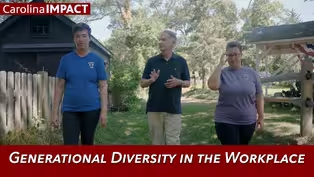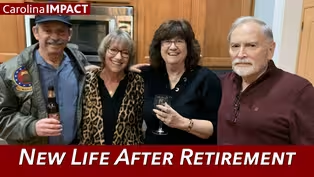
Four Stages of Retirement
Clip: Season 11 Episode 1120 | 5m 55sVideo has Closed Captions
Learn what experts call the phases of retirement and methods to navigate the roadmap.
The number of Americans retiring daily has nearly doubled since the year 2000. The latest research shows about 10,000 people turn 65 each day, which is the average age of retirement. Experts say not being prepared mentally and emotionally for that change, could leave you open for a bumpy ride. We show you the phases of retirement and methods to navigate the roadmap.
Problems playing video? | Closed Captioning Feedback
Problems playing video? | Closed Captioning Feedback
Carolina Impact is a local public television program presented by PBS Charlotte

Four Stages of Retirement
Clip: Season 11 Episode 1120 | 5m 55sVideo has Closed Captions
The number of Americans retiring daily has nearly doubled since the year 2000. The latest research shows about 10,000 people turn 65 each day, which is the average age of retirement. Experts say not being prepared mentally and emotionally for that change, could leave you open for a bumpy ride. We show you the phases of retirement and methods to navigate the roadmap.
Problems playing video? | Closed Captioning Feedback
How to Watch Carolina Impact
Carolina Impact is available to stream on pbs.org and the free PBS App, available on iPhone, Apple TV, Android TV, Android smartphones, Amazon Fire TV, Amazon Fire Tablet, Roku, Samsung Smart TV, and Vizio.

Introducing PBS Charlotte Passport
Now you can stream more of your favorite PBS shows including Masterpiece, NOVA, Nature, Great British Baking Show and many more — online and in the PBS Video app.Providing Support for PBS.org
Learn Moreabout PBS online sponsorship- [Retiree] 002.
- [Bea] All across the country, Americans are retiring.
The largest group known as baby boomers are in the midst of their retirement years.
In the United States, around 11,000 Americans are expected to celebrate their 65th birthday each day in 2024.
- All right, that's great.
- [Bea] This trend is expected to continue for the next decade and it comes with a measure of uncertainty and fear for some.
- I see more people that are anxious about it.
It's like, what's it going to be like?
So it's more, not really dreading it, but it's more concern about what this is going to be like.
- Hey, Steve, come on back.
- [Bea] She counsels her clients on navigating the retirement roadmap and it's potential roadblocks, and she says there are many.
- How do you squeeze all the juice outta retirement?
- Dr. Riley Moynes, an author and retired educator recently published "The Four Phases of Retirement: "What to Expect When You're Retiring."
The first phase called "The Vacation" represents the ideal retirement.
So we asked some retirees at Friendship Missionary Baptist Church, how they approached retirement.
- I was excited because I knew it was time.
I knew I wanted to do some traveling, so I was able to do that, but then I began to focus on me.
(water trickling) (gentle music) - [Bea] And that focus for many retirees can become the expansion of a hobby like gardening.
That's what retired assistant health department director Dr. Lena White did.
She's a lover of gardens and growing.
Now she's teaching others at the church.
- You know, when you retire and you have the time, you can do stuff like I did, which was get into Master Gardener's program with the county.
I think you gotta find something that you love to do.
You know, you can take your hobby that you had while you were working maybe, and then just expand it.
- [Bea] The experts say that, so-called vacation phase, representing the view of an ideal retirement generally last about a year.
But then comes phase two when the retiree begins to feel a sense of loss.
That phase is described as loss of a routine, loss of a sense of identity, the loss of work relationships, a loss of a sense of purpose, and for some, a loss of a sense of power.
For many retirees, anxiety and depression become a one-two punch in their lives.
- A lot of times people won't admit that they're depressed and sometimes they don't even know that that's what it is.
- There are stages and some of those are unpredictable, but there's definitely some loss and grief there.
Loss of job, role loss.
Maybe somebody was in a helping profession and they enjoyed helping and now all of a sudden they're going to really miss helping others.
- I think I was one of the lucky ones.
Yeah, but I've had some friends and have heard of some family members of friends who didn't have a plan and they don't do anything and they are miserable, miserable people and it's very sad 'cause there's so much that you could do.
- [Bea] For many, the loss phase ends when they accept phase three.
That's a time of trial and error.
- Let me see what you broke.
- [Bea] We asked ourselves, "How can I make my life more meaningful again "and contribute."
- Now we're gonna be making more of these lap blankets for folks in wheelchairs and folks who sit a lot.
- [Bea] And the need to keep trying and experimenting with different activities.
- Then some active things.
I've taken up pickleball, which is crazy.
I never thought I would be doing that, but I play pickleball three or four times a week.
- I think you have to be able to do something.
It can be something just as simple as taking a neighbor somewhere, you know, or just, you know, like we do.
We do knitting and crocheting.
- [Bea] And the fourth phase may be the best.
It is described as the time to reinvent and rewire.
The experts say during this phase, individuals answer these questions.
What's the purpose?
What's my mission?
It's also the time that individuals find the activities that fit their lives and doing service for others.
- I would say to make a plan and what do you really want to do with your life?
And also ask your body, what does your body want to do?
Does it want to join an exercise group?
Does it want to garden?
- Going home, sitting in front of the TV is not good.
You know, I think, and you have to find what your niche is.
You have to know yourself.
- There's a balancing act that you have to do.
You have to have some time to yourself where you aren't doing anything, where you just meditate or you rest or you take a nap.
- The first month after retirement, I didn't do anything.
I really didn't.
I didn't realize how tired I was.
I slept a lot.
But then after that I said, "Okay, I'm ready now."
- [Bea] And the retirees all agree when it comes to those retirement years, the best answer is simple.
Do you and do it well.
For "Carolina Impact," I'm Bea Thompson.
Generational Diversity in the Workplace
Video has Closed Captions
Clip: S11 Ep1120 | 6m 30s | Which generation is better when it comes to business ethics? Baby Boomers or Gen Z? (6m 30s)
Video has Closed Captions
Clip: S11 Ep1120 | 5m 22s | Retirement marks a fresh start with more time, see how locals are pursuing their passions. (5m 22s)
Video has Closed Captions
Clip: S11 Ep1120 | 5m 31s | Seniors are becoming more tech savvy as smart technology redefines their experience. (5m 31s)
Carolina Impact: April 9th Preview
Preview: S11 Ep1120 | 30s | Retirement: Generational Diversity, Four Stages, New Life After, & New Technology Skills. (30s)
Providing Support for PBS.org
Learn Moreabout PBS online sponsorship
- News and Public Affairs

Top journalists deliver compelling original analysis of the hour's headlines.

- News and Public Affairs

FRONTLINE is investigative journalism that questions, explains and changes our world.












Support for PBS provided by:
Carolina Impact is a local public television program presented by PBS Charlotte



